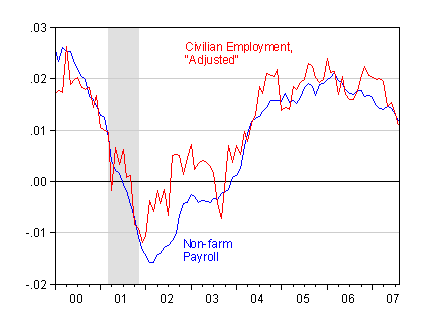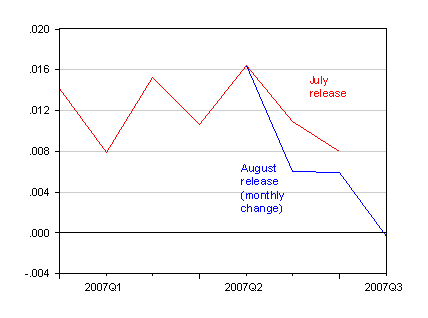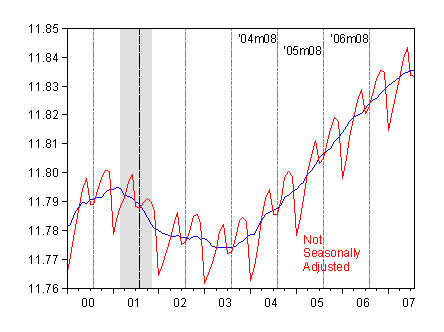Nonfarm payroll employment growth is 1.3% (12 month log difference). Civilian employment — adjusted to conform to the establishment payroll series — is 1.0%. These are the numbers for August 2007? Almost. Payroll employment growth was actually 1.2%. Those figures are for February 2001, the month immediately preceding the last NBER-defined recession.
So when you see this statement, from the White House website, Economy “Fact Sheet”, accessed 8 Sep 07:
Today, The Bureau Of Labor Statistics Released New Jobs Figures. Nonfarm payroll employment edged down in August by 4,000 jobs, meaning our economy has created 1.6 million jobs in the last 12 months, and 8.22 million since August 2003 when the labor market began its turnaround. Private employment increased by 24,000 jobs in August, marking the 48th consecutive month of private job growth. The unemployment rate remained unchanged at 4.6 percent, below the average of each of the past four decades.
think about these graphs:

Figure 1: 12 month log change in nonfarm payroll employment (blue) and in civilian employment, adjusted to conform to payroll definition/coverage (red). NBER recession date shaded gray. Sources: BLS, September 7 release.

Figure 2: Monthly log change, annualized, in nonfarm payroll employment, August data (blue) and July data (red). Sources: BLS.
Figure 1 shows that the last time both employment series exhibited the same growth rates, and the second derivative of the log level was negative (i.e., growth was decelerating) was in February 2001. Figure 2 shows that month-on-month growth has been substantially revised downward over the previous two months.
One difference is the unemployment rate; at 4.6 percent, it is 0.4 percentage points higher than it was in February 2001.
For alternative estimates of net job creation, see Jim’s post.
[Late addition, 9 Sep, 5:30pm Pacific]

Figure 3: Nonfarm payroll employment, seasonally adjusted (blue) and not seasonally adjusted (red). Gray shading is NBER-defined recession dates, dashed vertical lines denote August observations. Sources: BLS.
Technorati Tags: recession,
employment,
unemployment.
There is some interesting analysis of the labour market figures on Globalinsight:
http://www.globalinsight.com/Perspective/PerspectiveDetail10556.htm
They begin;
“The August jobs report was bad in almost all dimensions. Employment fell (by 4,000) for the first time in four years, and the bad news was widely spread. ”
Then continue;
“The government sector lost 28,000 jobs in August. The “unusual” decline in July, originally estimated at 28,000 jobs, was revised to show an even bigger 52,000 loss. Local government education (i.e., schools) has shed 102,000 jobs over the past three months.”
Which is large enough to explain the entire down grade of 80,000 for June and July. Given that we also know that the budget deficit, around 1.5% of GDP is particularly low, this implies there is more than some room for reflationary government measures should they be required.
The other thing to throw in when comparing 2001 with present is first of course the bursting of the Hi-Tech bubble, which was a speculative boom on a far higher scale than the present stock market recovery and second that profit rates remain high or climbing to record post war highs, whereas in 2001 they were at levels as low as they had fallen since 1945.
bill says
Which is large enough to explain the entire down grade of 80,000 for June and July.
As is the decline in manufacturing or construction jobs in the private sector where job terminations are notoriously short-noticed (the invisible hand, unlike the government hand bein so much more efficient, not having to wait for official announcements –provoking the creation of guesstimates), no?
How izit that the birth/death model applies to government jobs when one would assume that the BLS has that information right next door?
If the governments have cut back (however surprisingly to account for these revisions) have they done it out of meanness…or because they have no “room for reflationary government measures “?
Great post Menzie…greater than my immediate capacity to feel the force of the mathematical techniques…which one might think undermines my commendation…but they would be wrong as it coerces me to mull it over (review, rethink, reexamine and discover)…and I need some stewing time to poke back. In the mean time, thanks for the provocation.
Nice work to show the parallel to ’01, Professor.
It must be tough being a public leader with a brain. Edward Lazear is a smart guy (I was in a macroeconomics class of his, and he was an excellent teacher). When I hear him and Paulson and Bernanke make the statements that they do, I just shake my head. They know better; so, they must think that the rest of us are a bunch of dummies. How else to explain their statements over this past year? I understand that they must not panic folks, but why don’t they speak the truth: “Watch your spending, folks. Be productive, folks. Be careful of long-term financial commitments, folks.”
I wouldn’t buy all that profit talk nor the tech bubble burst as more intense. The housing bust is just as bad, I have a feeling worse. Considering the lack of investment in the US, profits better be there. It explains the average job growth over the last few years even though most of those gains were in housing.
The biggest speculative housing bust since the 1920’s has started, we all know how that ended to.
JG, You don’t tell a 4 year-old his dead mother’s not in heaven looking down on him; you don’t yell fire in a crowded movie theater; and, if you’re the fed chief, you don’t say there’s going to be a recession when you’re confident there will be one. Sometimes honesty is not the best policy.
I believe charts has put his finger on Greenspan’s m.o.
In past cycles strong underpinnings of the economy led to a strong housing market, not so this time, it was housing leading the economy, and as folks refinanced from high rates to lower ones coupled with much higher asset prices in their one and only asset, their home, the equity was consumed causing a strong global economy due to the spending down of the trillions of equity that was fasely there in the first place. Job creation came from housing and housing “related’, I had read there were more real estate brokers than doctors,and lawyers combined, not to mention the boom in mortgage brokers,carpenters, etc, etc.
The music has now stopped, what concerns me the most is when the Fed does cut what area of the economy will that stimuli affect?
Nice overview James and I’m of the same opinion that it is not clear that there is a connection to some fledgling industry that would burst out and re-stimulate the economy…if it only had those cheaper interest rates.
No, so far the cupboard looks empty…and all the more reason to worry about provoking a war with Iran to avoid a domestic economic implosion.
Back to Fig 2, the BLS made corrections to the employment data that added 1M to the tally (~3 times the usual benchmark adjustment) as of Dec 06 IIRC. I think this was conservative. With the possible (but undocumented of course) exodus of these illegals with the housing downturn could this depiction of the fall in employment be somewhat overstated? (As in, yeah but those were illegal jobs that were never recognized/counted/registered anyhow.)[As over-stated as the presumption that the illegals are returning to Mexico…where there are still worse job prospects.]
The thing I’m keep wondering about is that the way the calender worked this year — the last day of the month was on Friday — is that maybe we are getting a seasonal adjustment problem with education and teen age employment. Without the large drop in these two series the employment reports would have been weak — more in line with other indicators — but not so severe. Do you know of anyone with detailed knowledge of this issue discussing it?
calmo, My thoughts on illegals are as follows.It is fact that a lot of illegals have been employed in housing and it’s related industries, true they were not counted, But they bought cell phones, food, gasoline, etc, etc,or put another way they consumed, and helped GDP.Even though their layoffs do not appear in government statistics, their reduced consumption will negatively impact GDP, and ultimately corporate earnings. I enjoyed Your post, and appreciate the positive feedback.
spencer: I don’t know the answer to your question, but I have plotted the seasonally adjusted and not seasonally adjusted data in a new Figure 3. You’ll see that typically the NSA series rises in August — but not this year.
James: I agree — it’s not clear monetary policy can affect business fixed investment or residential investment given the overhang in the latter, and prospects for growth in the former (see here. However, to the extent that expansionary monetary policy could depreciate the dollar, it is conceivable that net exports could be the engine of growth. This scenario relies upon Europe and East Asia remaining decoupled from the US slowdown, however.
Well thank you James (what the hell did I say? Oh yeah “nice overview” and I still think so and I happen to share the “same opinion”…and I need to fess up that mine might be a bit wobbly). Your remark about the “illegals” still adding to GDP because they are still consuming needs to be tempered (possibly barbecued)[sadly, no longer of “the same opinion”] with the observation that the bulk of these people send the bulk of their pay checks back to Mexico…and the IRS knows this and yet those 12M are somehow counted as part of the labor force, no?
Menzie thinks it’s conceivable that exports could be the engine of growth should we get that loosening –precipitating a depreciating dollar. So what actual products are these going to be and who is going to buy them? [So “conceivable” but hard to imagine…and believe (have you no convictions?)] Hard to believe the former export strengths would continue to expand and prevail when the market (US consumer goods) supporting that reinvestment (retooling, finance) has weakened.
Menzie: I believe ROW (Rest Of World) will slow as demand from the US wanes, and “the mortgage flu’ continues to sow seeds of worry all over the globe. Also once the “Olympics factor” is over in China this might knock GDP down a point or so, and current high inflation will act as a drag on their economy. China is in it’s “capitalistic infancy” and any slowdown, coupled with high inflation, and lack of confidence in it’s biggest customer will be a real test for it’s resilicency.
Menzie wrote:
However, to the extent that expansionary monetary policy could depreciate the dollar, it is conceivable that net exports could be the engine of growth.
Menzie,
This is mercantilism at its finest and just the prescription the IMF has given to developing countries that has taken them to triple digit inflation and destroyed their asset bases.
If a developing country makes such a horrible mistake it can recover because the developed nations can give at least a little support to counter their mistake of following the IMF, but if the US goes down this route there is no one to pull the world out of economic disaster.
Menzie, sorry, I actually wanted to thank you for the information on the jobs report. This is an important comparison. It is certainly more evidence that the FED is far, far behind the curve.
Greenspan had more of a business background so he would often take decisive action as the problems were unfolding. Bernanke is an academic and he waits until all the data is in before he makes a decision. This may be okay if you are writing a history book or looking to explain what happened, but, when you are pretending to manage the money supply and economy, waiting for the data can equate to disaster especially since many of the indicators are six months old.
If BB and crew don’t take decisive action the problems could get much worse, but, if his first 6 months are any evidence, we are in for a rough ride.
calmo: I think that since there is ambivalence in the economics profession regarding the empirical basis for decoupling, this characterization seemed appropriate. In any case, I’ve discussed my skepticism of this view previously.
DickF: Compliment accepted. My discussion of the monetary policy impact on net exports was not meant to be an argument in support of expansionary policy. Rather it was a positive (as opposed to normative) assessment of the textbook channels whereby which aggregate demand can be affected by monetary policy.
Menzie, thanks for the explanation. While we are still far apart in economic philosophy (Keynes v classical) I better understand your comment.
Menzie: Great dialogue, with You and calmo. I agree that a depreciating dollar will make US exports a greater value, but the things we export, “the machines that make the machines” will decline as demand for China and India’s products drops due to a US consumer that is becoming unemployed, and foreclosured upon.
calmo, the illegals do not “export” all their earnings, and most of the recent job growth has come from the service sector, which illegals have a dual effect, providing low “unit labor costs”, and spending more on service related vs big ticket items. True they do not spend as much as most Americans, but then again, who does.